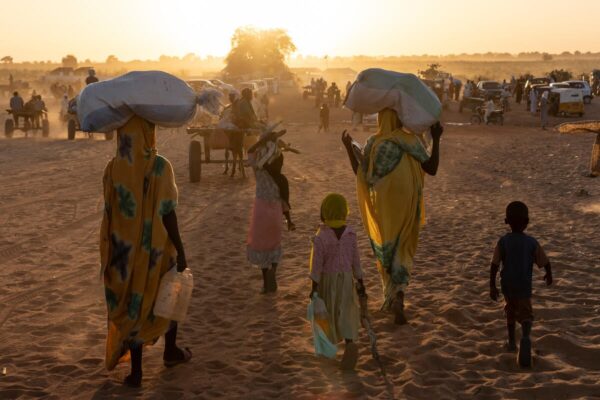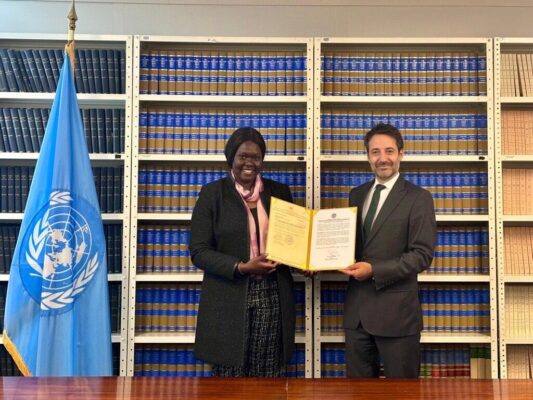
© UNHCR/Andrew McConnell
Baku – People forced to flee war, violence and persecution are increasingly finding themselves on the front line of the global climate crisis, a new report warns, exposing them to a lethal combination of threats but without the funding and support to adapt.
The report, released today by UNHCR, the UN Refugee Agency, in collaboration with 13 expert organizations, research institutions and refugee-led groups, uses the latest data to show how climate shocks are interacting with conflict, pushing those who are already in danger into even more dire situations.
Of the more than 120 million forcibly displaced worldwide, three-quarters live in countries heavily impacted by climate change. Half are in places affected by both conflict and serious climate hazards, such as Ethiopia, Haiti, Myanmar, Somalia, Sudan and Syria.
According to the report – No Escape: On the Frontlines of Climate Change, Conflict and Forced Displacement – by 2040 the number of countries facing extreme climate-related hazards is expected to rise from 3 to 65, the vast majority of which host displaced people. Similarly, most refugee settlements and camps are projected to experience twice as many days of dangerous heat by 2050.
“For the world’s most vulnerable people, climate change is a harsh reality that profoundly affects their lives,” said UN High Commissioner for Refugees, Filippo Grandi. “The climate crisis is driving displacement in regions already hosting large numbers of people uprooted by conflict and insecurity, compounding their plight and leaving them with nowhere safe to go.”
For example, the devastating conflict in Sudan has forced millions of people to flee, including 700,000 who have crossed into Chad, which has hosted refugees for decades and yet is one of the countries most exposed to climate change. At the same time, many who fled the fighting but remained in Sudan are at risk of further displacement because of severe flooding that has blighted the country.
Similarly, 72 per cent of Myanmar’s refugees have sought safety in Bangladesh, where natural hazards such as cyclones and flooding, are classified as extreme.
“In our region, where so many people have been displaced for so many years, we see the effects of climate change before our very eyes,” said Grace Dorong, a climate activist and former refugee living in South Sudan. “I hope the voices of the people in this report help decision-makers to understand that if not addressed, forced displacement – and the multiplying effect of climate change – will get worse. But if they listen to us, we can be part of the solution, too.”
The report also highlights that climate financing is failing to reach refugees, host communities and others in fragile and war-torn countries, so their ability to adapt to the effects of climate change is fast deteriorating.
At present, extremely fragile states receive only around US$ 2 per person in annual adaptation funding, an astounding shortfall when compared to $161 per person in non-fragile states. When investment does reach fragile states, more than 90 per cent goes towards capital cities, while other places rarely benefit.
The findings are published during COP29 in Baku, Azerbaijan, where UNHCR is calling for increased climate finance that reaches those most in need. The refugee agency is also urging states to protect forcibly displaced people who face the additional threat of climate disasters, and to give them and the communities that host them a voice in finance and policy decisions.
“The climate emergency represents a deep injustice,” Grandi said. “People forced to flee, and the communities hosting them, are the least responsible for carbon emissions yet are paying the highest price. The billions of dollars in climate financing never reach them, and humanitarian assistance cannot adequately cover the ever-widening gap. Solutions are at hand, but we need urgent action. Without proper resources and support, those affected will be trapped.”
Note to editors:
For broadcasters, news organizations and other media professionals: download photos and b-roll here.
See the data visualization story here.
The report – No Escape: On the Frontlines of Climate, Conflict and Displacement – will be officially released during the 2024 UN Climate Change Conference (COP29) in Baku during a press conference on 12 November 2024 at 14:30 with the UN High Commissioner for Refugees, Filippo Grandi and Grace Dorong, a refugee advocate for climate action.
This is UNHCR’s first climate report and explores the intersection between climate and displacement, gaps in current climate financing, the future of legal protection for those impacted and the need for investment in resilience projects in fragile and conflict-affected settings. To produce this report, we have joined forces with 13 expert organizations, research institutions and refugee-led organizations.
UNHCR, the UN Refugee Agency, has a senior team at COP29 in Baku to ensure the plight of displaced people and their urgent need for protection, financing and support is included in discussions and decisions throughout the summit.
For more information on this topic, please contact:
- In Geneva, Olga Sarrado, sarrado@unhcr.org, +41 79 740 2307
- In Baku, Joelle Eid, eidj@unhcr.org, +34 605 98 13 21
Originally published by UNHCR on 12 November 2024.





